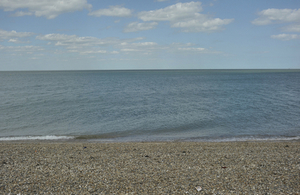Water quality testing begins at bathing beaches
From this week, the Environment Agency begins the annual water quality testing at over 400 popular bathing beaches.

Environment Agency begins annual water quality testing at over 400 popular bathing beaches
Water quality for beach-goers was better than ever in 2015. A total of 97% of England’s bathing waters passed and 264 beaches met our top ‘Excellent’ water quality standard.
During the bathing water season environment officers will take 20 samples at each location, from mid-May until the end of September. These will be tested in Environment Agency labs and the results published on the Bathing Water Explorer website shortly afterwards.
Hundreds of joint projects have been completed to successfully drive up standards over recent years: water companies have made significant investments to reduce pollution, councils and charities have run campaigns to keep beaches clean and advice has been provided to farmers on how to reduce pollution into rivers.
The Environment Agency remains committed to working with a range of partners to maintain these high standards and further improve the water quality in rivers and at beaches. This involves innovative investigations, catchment wide campaigns and local partnership action groups.
Our new higher standards are now in place and beaches get an annual rating of Excellent, Good, Sufficient or Poor.
From this year beach managers will be required to display these ratings and information about water quality at each beach. Out of 415 bathing water locations only 10 have been rated as Poor. All beaches remain open for the public to use.
Water quality at beaches in England has improved dramatically over recent years. However even at ‘Excellent’ beaches water quality can sometimes be temporarily reduced, particularly after very heavy rain.
Dr Pete Fox, Director of Land and Water at the Environment Agency said:
Huge improvements have been made to water quality over the last few decades to meet these tougher standards. Along the English coastline there are 264 ‘Excellent’ beaches to enjoy.
The Environment Agency has led successful work to monitor, investigate and reduce pollution, which has benefited the environment and people.
Information and advice about water quality is available at every bathing beach and online on the Bathing Water Data Explorer.